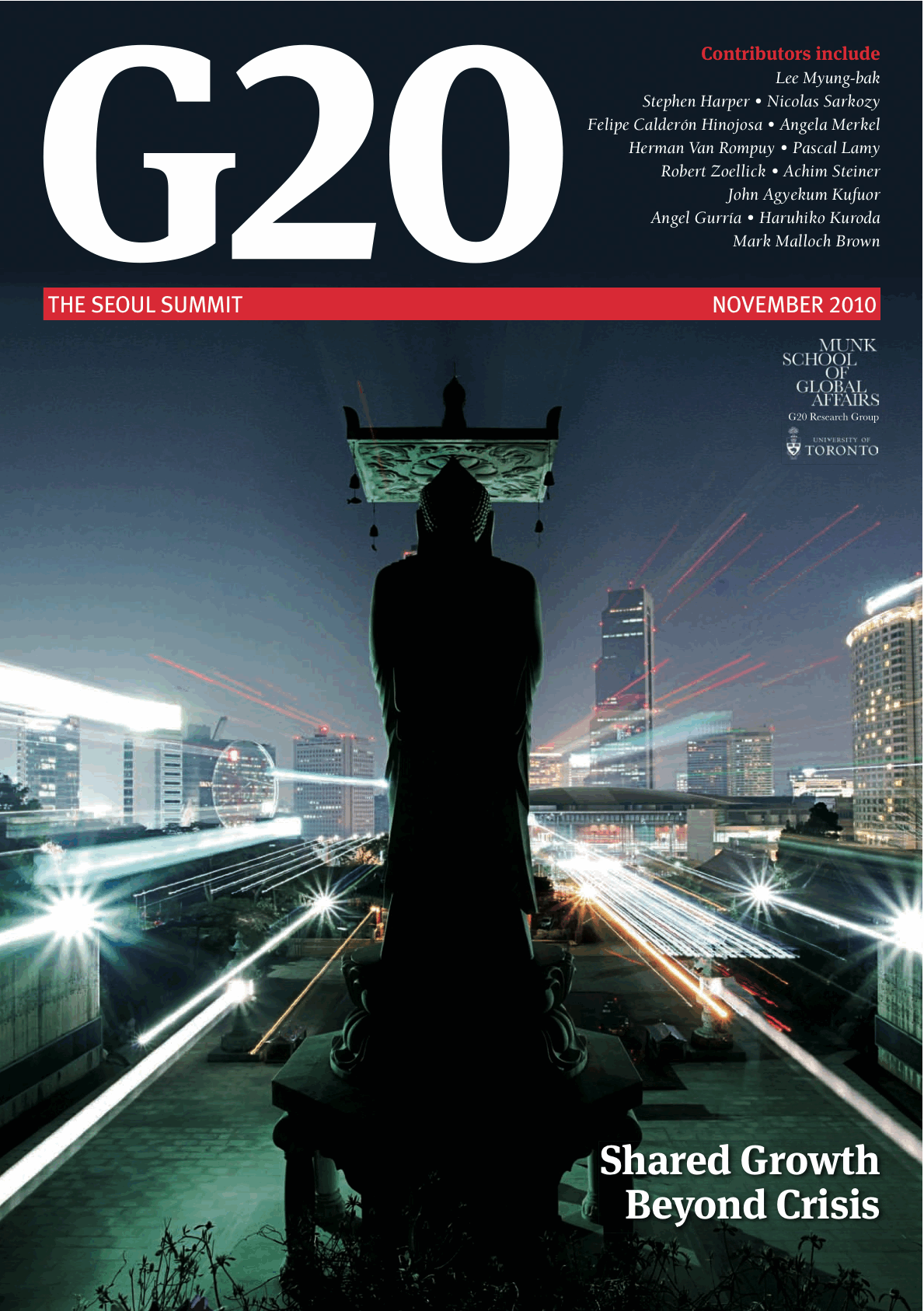

 |
 |
|

Overcoming the crisis in Europe and in the world
By Herman Van Rompuy, president, European Council
In this post-crisis period, the European Union stands ready to play its part in securing and maintaining global economic and financial stability
To download a low-resolution pdf, click here. (Be patient! It's 50 MB.)
The G20 has been instrumental in dealing with the immediate economic and financial crisis. The challenge now is to deal with the post-crisis period. The European Union is fully committed to the success of this global endeavour. The G20 summit in Korea is taking place at a time of renewed challenges to the world economy. Overall, growth is higher than previously anticipated, albeit coming at different speeds throughout the world. However, we still need to continue to act to prevent such a crisis from occurring again. All global actors have to take up their responsibilities in this respect. It begins by ensuring that our own houses are in proper order.
Earlier this year, the European Union acted decisively to restore the stability of the eurozone. In the spring, the financing problems of the Greek government turned into a serious crisis for the euro area as a whole. At the height of the crisis, during the weekend of 7 to 9 May, the survival of the euro itself — and hence of the EU — was in question. Financial markets from Tokyo to New York held their breath. The EU faced this challenge resolutely. We won the battle of the euro, although all problems are not solved yet.
On 7 May, the heads of state and government of the 16 euro area countries decided to use all means available to safeguard the stability of the euro. Within 48 hours, a safety mechanism was designed: a system of conditional loans of Ä750 billion (which is now in place). Several member states announced immediate extra budgetary and economic measures. These were bold decisions. They were politically and socially difficult, but they show our collective determination to ensure the stability of the euro.
We also acted to ensure the soundness and stability of the European financial system. Recently, legislation to improve supervision of the financial system was adopted. The system will be in place on 1 January 2011. Before the summer, we undertook stress tests of major European banks: more than 90 per cent passed this successfully. The reform of financial markets remains one of the central elements in our overall reform strategy. These and other measures fulfil our G20 commitments. They have restored confidence in our macroeconomic and financial stability. This new confidence contributed to the ongoing economic recovery.
The way the EU works is not always easy for outsiders to grasp (neither, for that matter, are the intricacies and opacities in other capitals of the world always easy to grasp!). However, in difficult times the invisible and underestimated forces that hold the EU together come to light. People should be assured that should the EU face another daunting situation like it did this spring, we will mobilise the same full-scale political resolve. But our aim is to prevent a new crisis.
In order to further reduce the risk of a public financing crisis, we are strengthening the EUís fiscal rulebook, the Stability and Growth Pact. Stricter compliance with the rules and a stronger focus on debt sustainability should help to keep public finances in check. We will also monitor countriesí macroeconomic developments more closely, thanks to the creation of an early warning system to detect the risk of real estate bubbles or of unsustainable patterns in the balance of payments. While keeping the responsibility for macroeconomic policy at the national level, these constraints by the EUís economic governance will create a new convergence in economic developments and economic policy, which is a necessary condition for a monetary union.
To support the recovery, the focus on restoring confidence in fiscal consolidation must go hand in hand with bold structural economic growth strategies. This is why the EU has redefined its agenda for structural reforms. The Europe 2020 Strategy sets out an ambitious programme to raise the EUís potential, increase employment and promote a greener economy. All 27 EU members share these objectives. All of them are already engaged in implementing them.
Securing strong and sustainable growth is a common priority for all members of the G20. Thanks to intensive trade relations, G20 members can help one another to create jobs and growth for our citizens, provided basic rules of the game are respected by all actors. Close coordination within the context of the G20 remains a key element in this respect. Our coordinated approach to provide exceptional fiscal stimulus was very effective in 2008-09. At the Toronto Summit in June, we agreed on differentiated growth-friendly exit strategies. In Seoul, we need to deliver on the G20 framework for growth, which should become the instrument to coordinate our economic policies. Each country or area faces its own challenges, but acting cooperatively in a consistent manner will benefit us all.
Financial stability is a global common good. Last June, the European Council of Heads of State and Government agreed that member states should introduce a levy or tax on financial institutions to ensure fair burden sharing and contain systemic risk. The EU favours an international approach to this issue to ensure a world-wide level playing field. It will continue to advocate this position at the G20.
Regarding the reform of the International Monetary Fund (IMF), Europe is fully committed to implement the decision of the Pittsburgh Summit in November 2009 concerning quota reform. We are actively involved in the reform of the IMF board, so as to enhance the representativeness and legitimacy of the institution.
We are one world. The financial crisis has shown clearly that our destinies are interlinked, financially and politically. In 2008, the political leaders of the world were able to translate this awareness into the common framework of the G20; this has proved its worth beyond doubt. The challenge of the Seoul Summit will be to keep this level of common awareness and to act upon it. Global economic and financial stability is at stake, and thus the welfare of the worldís citizens. The 27 member states and the 500 million citizens of the European Union remain ready to play their part.
|
This Information System is provided by the University of Toronto Library |
All contents copyright © 2024. University of Toronto unless otherwise stated. All rights reserved.